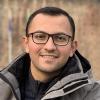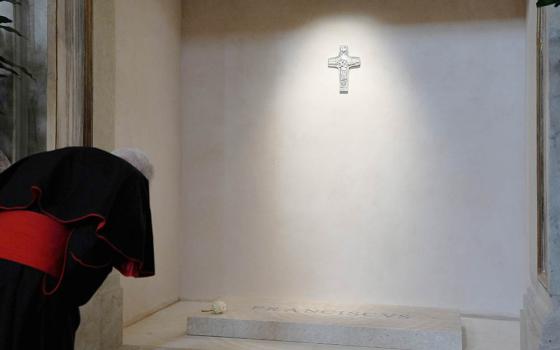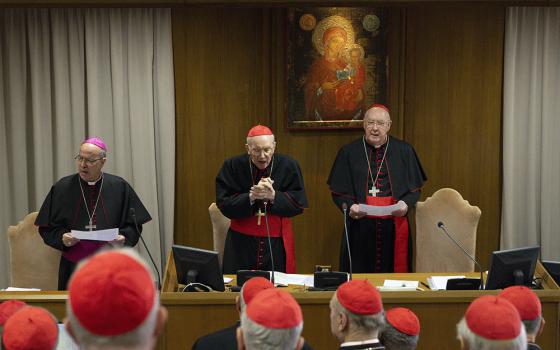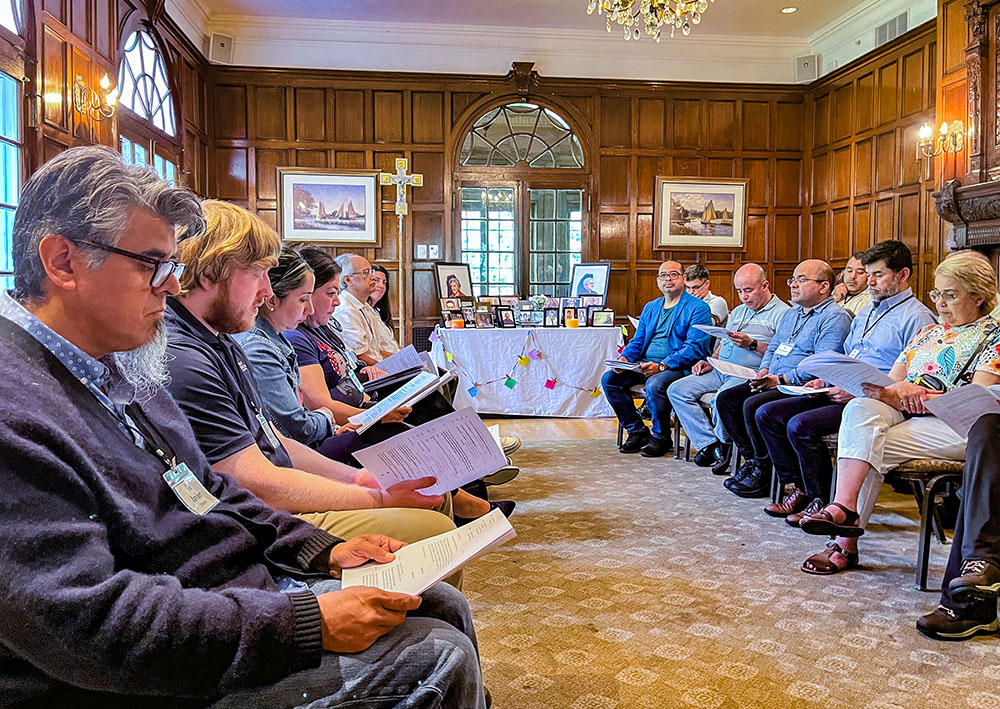
As the Academy of Catholic Hispanic Theologians of the United States gathered for its 2024 colloquium, each day was preceded by moments of prayer and liturgical celebrations. (Luis Donaldo González)
For Hispanic theologians in the United States, caminar en conjunto or walking jointly is urgent for the Catholic Church's present and future. It means walking as one people of God that celebrates the church's faith, practices, service and witnesses as a community. Today's synodality calls us to walk jointly, to build ways and journey together, listening to all and discerning together.
Understanding the urgency of this work, the members of the Academy of Catholic Hispanic Theologians of the United States (ACHTUS) dedicated our 2024 Colloquium to "Synodality En Conjunto: The People of God, the Bible, and Theology."
There is no time to lose for all laity and clergy, religious people and theologians, pastoral leaders and families to sit at the same table for dialogue, beyond any differences or conflicts within the church. Emilce Cuda, secretary of the Pontifical Commission for Latin America and a special guest at this meeting, reminded us that it is normal and healthy to have differences.
Our colloquium was held June 9-12 at the Connors Center of Boston College in Dover, Massachusetts. Fifty professors and theology graduate students gathered from many colleges and universities, including scholars from Mexico.
"Somos el cuerpo de Cristo / We are the body of Christ," we sang together in English and Spanish during the opening Mass presided over by Auxiliary Bishop Cristiano Barbosa of Boston.
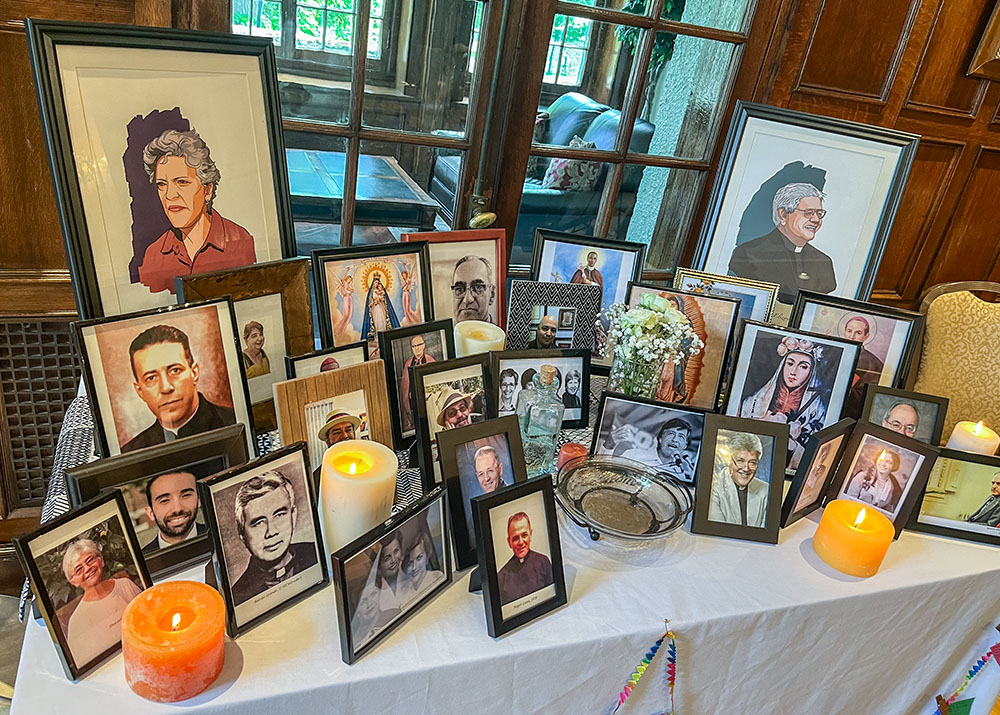
The cloud of witnesses was placed in one of the rooms adapted as a prayer room at the Connors Center. During the opening Mass, the cantor sang the names of Ada María Isasi-Díaz, Ignacio Ellacuría, Alicia Marril and San Óscar Romero, among so many others, and we the community responded as one, "¡Presente, presente!" (Luis Donaldo González)
At the offertory and as part of a spiritual community, we also remembered those who have gone before us en la lucha (in the struggle) and who today are part of our cloud of witnesses. The cantor sang the names of Ada María Isasi-Díaz, Ignacio Ellacuría, Alicia Marrill and San Óscar Romero, among so many others, and we the community responded as one, "¡Presente, presente!"
The colloquium was designed to listen to many different voices equally, from theologians to pastors and lay pastoral leaders. In each panel, senior and junior theologians shared the table with younger scholars and students — each reflection moment was designed to raise dialogue and keep the conversation going.
Pope Francis was the first to participate in this colloquium. "I invite you ... to be builders of bridges between the Americas," Francis told us in a video message — the first ever address by a pope to Hispanic theologians in the United States.
Francis asked us not to forget our roots so that we can do theology with our heads, hearts and hands. This means a theology that pursues a dignified life for all, especially for the migrants who come to this land.
"The preferential option of the Catholic Church is not just for the poor, but above all, with the poor," the pope remarked, pointing out that synodality cannot be done without the people, but it is done together with the people.
To walk together with the people, it is necessary to listen authentically. Listen to God and God's children. Hence, Ahida (Calderón) Pilarski, president of the Academy of Catholic Hispanic Theologians of the United States and professor at St. Anselm College, organized this colloquium as an authentic listening exercise. "Shema ACHTUS!" ("Listen ACHTUS"), she underlined during her presidential address, echoing Deuteronomy.
To arouse and engage the conversation between theologians and the hierarchical church, Pilarski invited each of the presenters to reflect on and respond from their own theological subdiscipline to the U.S. and Canadian "North American Final Document for the Continental Stage of the 2021-2024 Synod."
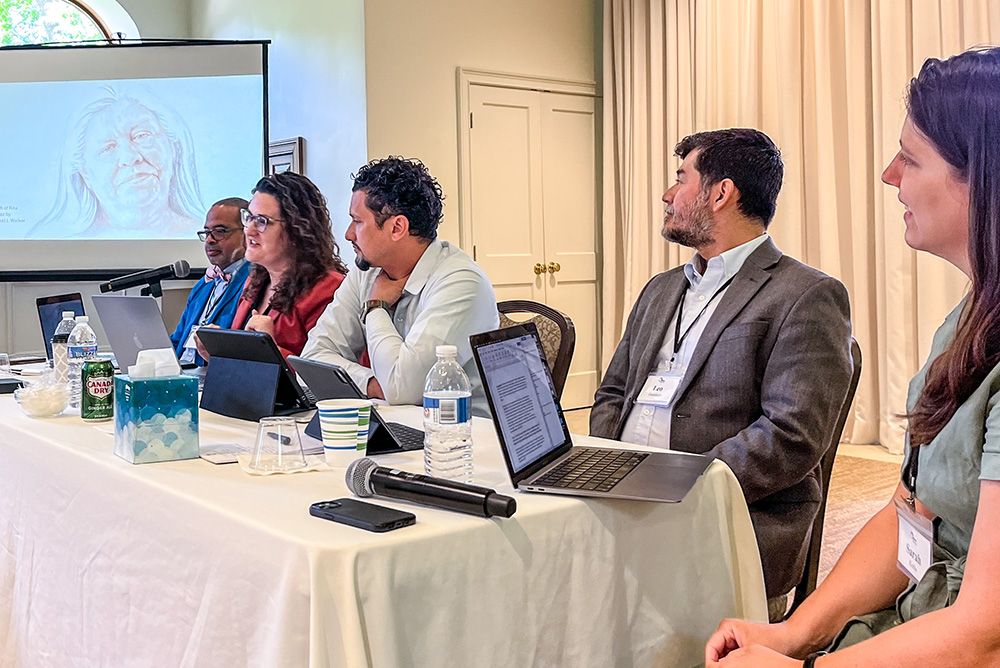
Jennifer Owens-Jofré presents her paper while sharing the table with Francisco Castillo, Jeremy Cruz, Leo Guardado and doctoral student Sarah Kothe. (Luis Donaldo González)
Additionally, the colloquium also offered a specific panel where Latin American theologians shared insights on the document from the Latin American bishops' council (CELAM) on the synod's continental phase.
It makes sense, since authentic listening to all parties is crucial for synodality en conjunto, as it helps us to conocer y re-conocer (understand and recognize) the signs of the times. In other words, if we ignore la realidad (the realities or current context), we will remain only in ideas, as Pilarsiki mentioned.
"The theological task of the 21st century requires that we continue to use recognized rigorous methods of research within our field and beyond (creating new ones when needed), but these methods must integrate the meaningful engagement of people's lived experiences en lo cotidiano [the everyday]," Pilarski argued.
En conjunto insights
The synodality en conjunto model should lead to the Catholic Church to become an ever larger tent — a church that welcomes, promotes and integrates everyone, as Francis also pointed out in his video message. Under this understanding, I will highlight three strong insights that I heard during the colloquium and that resonate in my mind and heart.
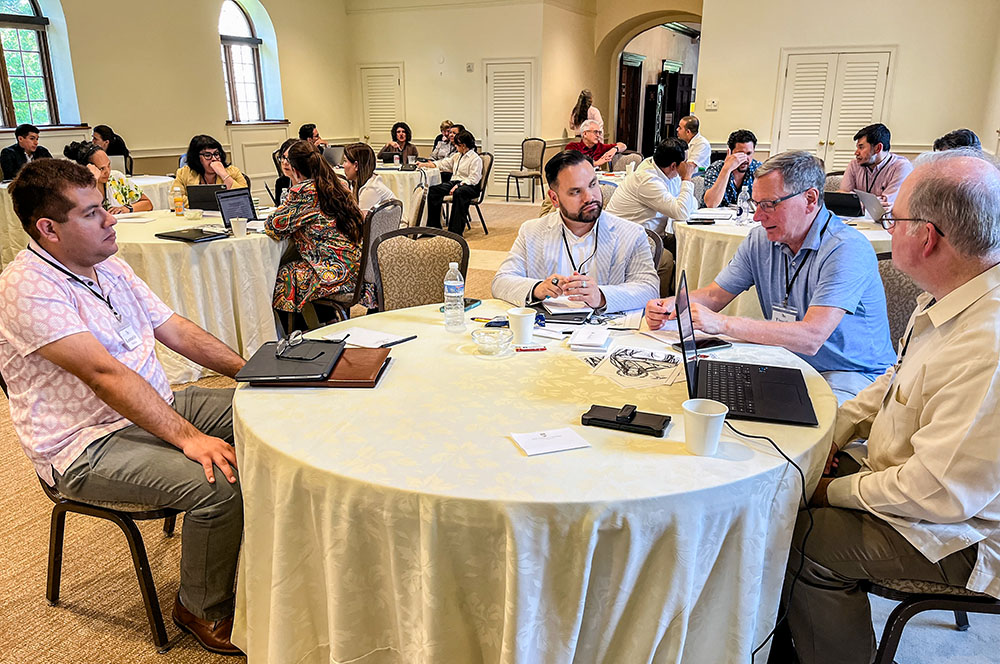
Senior and junior theologians shared the tables with younger scholars and students — each reflection moment was designed to raise dialogue and keep the conversation going. From left: Leo Mendoza, doctoral student at Loyola University Chicago; César (CJ) Baldelomar, doctoral candidate at Boston College; University of Notre Dame Professor Timothy Matovina; and St. Martin's University Professor Ramón Luzárraga. (Luis Donaldo González)
First, making the church-tent understood as a family home for all is undoubtedly one of the priorities of Hispanic theologians.
"The litany of groups that the document mentions who don't feel welcome in the church include women, youth, immigrants, racial or linguistic minorities, LGBTQ+ communities, the divorced and the remarried, and persons with diverse physical or mental abilities," noted Fordham University professor Leo Guardado. "Theologically speaking, however, the [North American] document does not acknowledge the ecclesiological truth that they are already the church and without this explicit acknowledgement, any discourse of welcome, inclusion, and communion reinforces the logics of the margins being received by the center."
Advertisement
Second, synodality en conjunto is the key to action for the U.S. Catholic Church, which is increasingly Hispanic. According to Boston College professor Hosffman Ospino, 45% of Catholics in this country self-identify as Hispanic. These numbers show that almost half of the Catholics in the U.S. understand the church as iglesia — in Spanish. On the other hand, it proves that we Hispanics/Latinos are no longer a minority for the Catholic Church in this country, which is now our home.
"If we want Hispanic Catholics — particularly young Hispanics — to remain engaged, build thriving faith communities, and advance transforming evangelizing projects, we cannot treat them as second-class citizens in our church," Ospino stated.
Synodality en conjunto is the way for the voices of all cultural heritages to be reflected in the church's life as an active part of the people of God. It is both a way to build cultural and theological bridges and a way to live together, as a big and authentic family with diverse children.
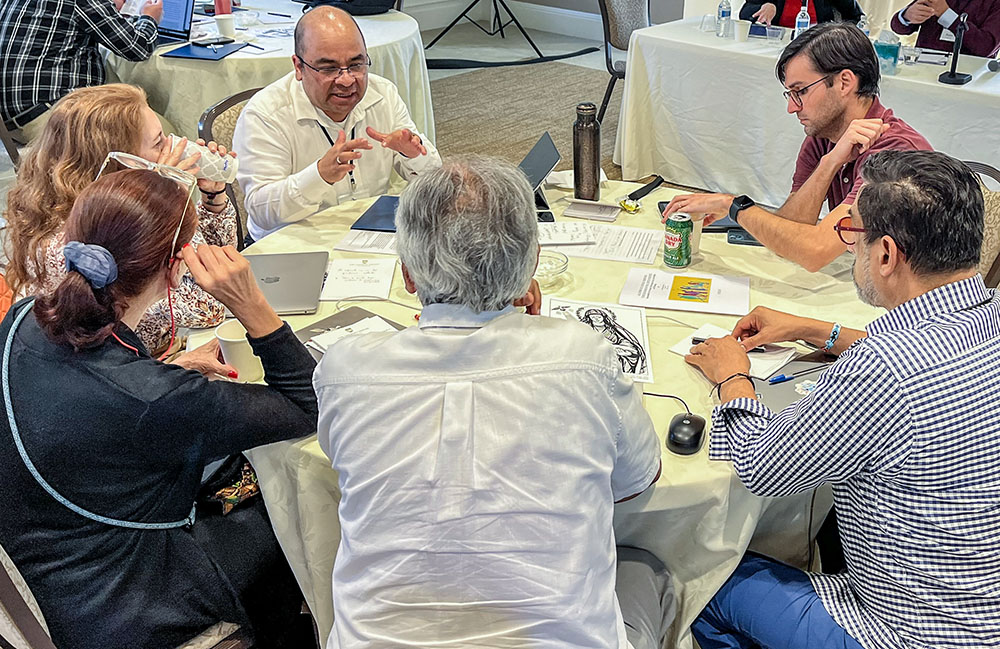
After each of the seven theological reflection panels, participants had the opportunity to discuss with each other and engage in conversation. (Luis Donaldo González)
Third, as I mentioned earlier, to go beyond abstract ideas it is absolutely necessary to know la realidad, lo cotidiano and to discern as a whole in the light of the Gospel.
"The process of discerning our commitment, accompanying la realidad, imagining ways to transform it, and then acting with courage, has to always be pointed toward the reign of God," argued Cecilia González-Andrieu, president-elect of the Academy of Catholic Hispanic Theologians of the United States and professor of Loyola Marymount University.
Gaudium et Spes states that the Catholic Church has an eschatological mission, but it always seeks to build the reign of God on this earth. So all our efforts in ecclesiology, faith and service should be addressed to achieve it, otherwise our church action does not make any sense.
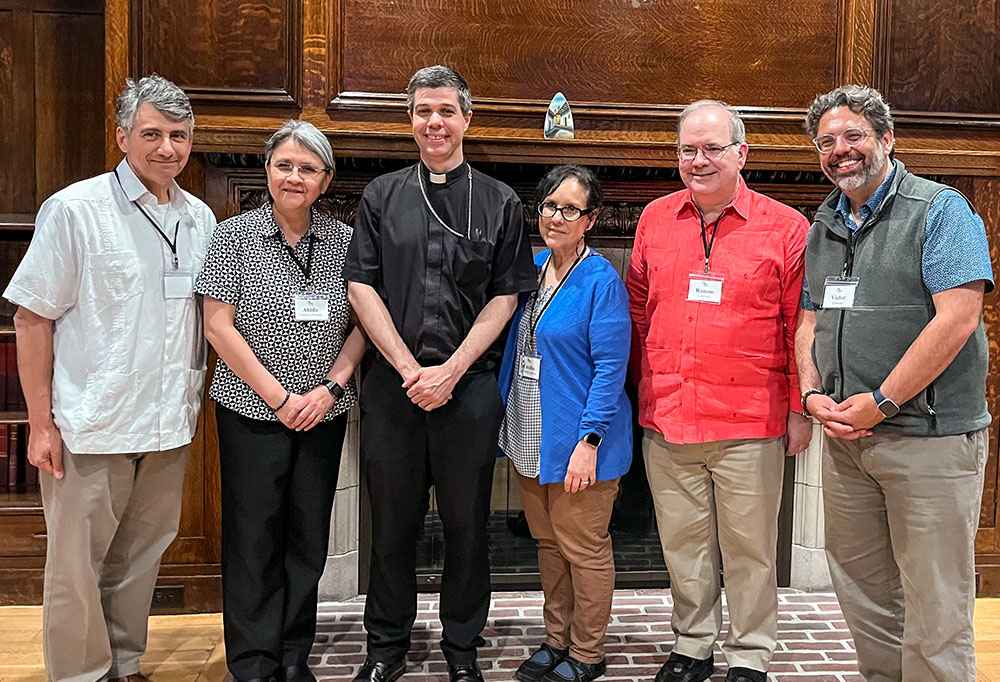
From left: Peter Casarella, professor at Duke University; Ahida (Calderón) Pilarski, president of the Academy of Catholic Hispanic Theologians of the United States and professor at St. Anselm College; Auxiliary Bishop Cristiano Barbosa of Boston; Cecilia González-Andrieu, president-elect of the academy and professor at Loyola Marymount University; Ramón Luzárraga, past-president of the academy and professor at St. Martin's University; and Victor Carmona, professor at the University of San Diego (Luis Donaldo González)
Church-tent
Listening to professors and colleagues, it seems to me that our urgent option as a Catholic Church is to understand that our church-tent is built on authentic listening, discernment and the recognition that there is communion among the differences. "Catholicity never means uniformity," pointed out Professor Peter Casarella of Duke University.
The synodality en conjunto that we reflected on at the 2024 ACHTUS Colloquium aims at a church of listening, dialogue and working jointly between pastors and community. We are talking about a church-tent in which we can celebrate Christian faith and walk together, thanks to the fact that we have more than enough room for the different charisms that the Holy Spirit awakens — sí, because we believe in a living God who is dynamic and continues to speak to his people who listen, make ways and journey in communion.
"Somos el cuerpo de Cristo / We are the body of Christ," in English, Spanish and all languages. We are a church journeying en conjunto.
